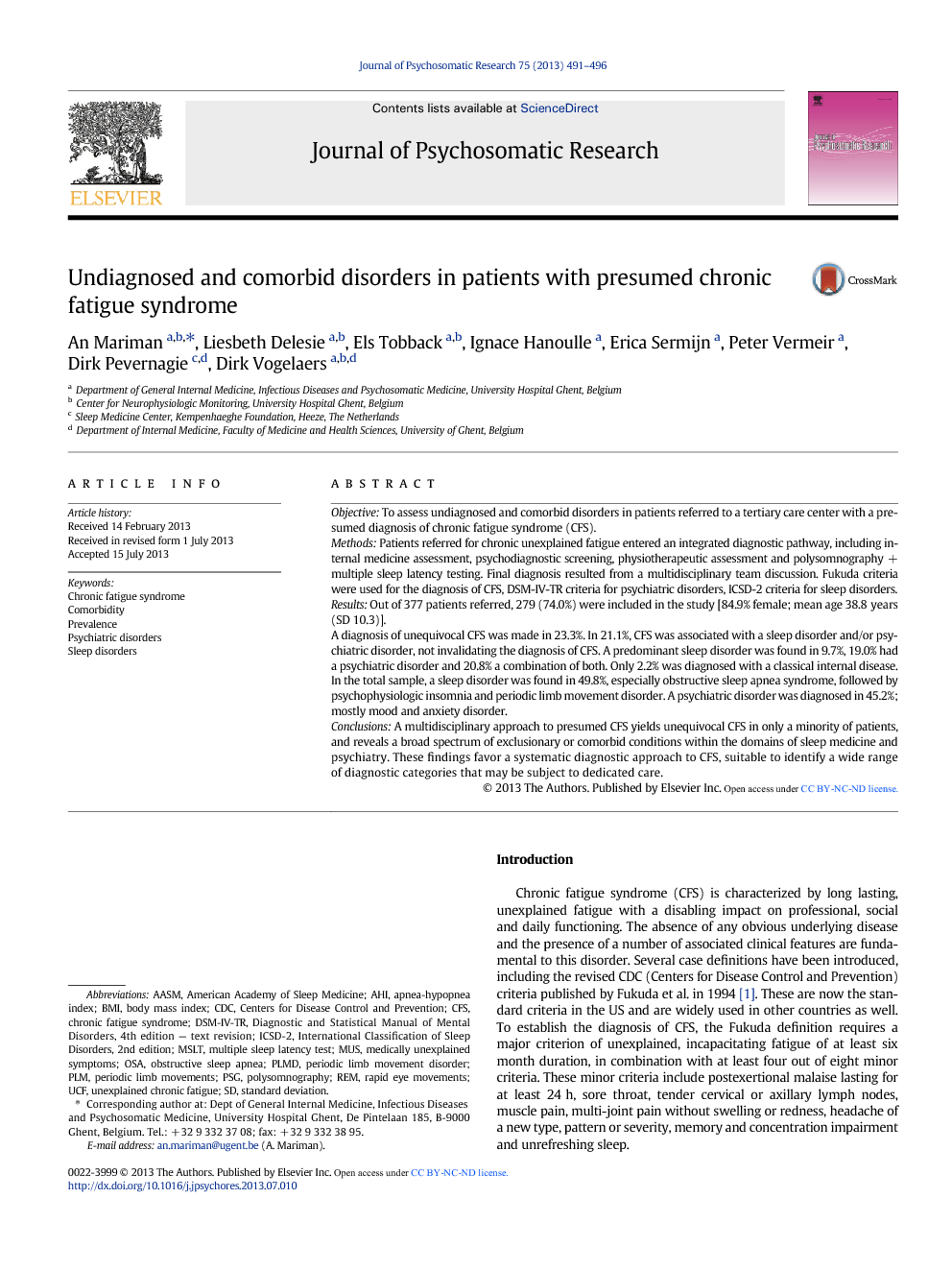Objective
To assess undiagnosed and comorbid disorders in patients referred to a tertiary care center with a presumed diagnosis of chronic fatigue syndrome (CFS).
Methods
Patients referred for chronic unexplained fatigue entered an integrated diagnostic pathway, including internal medicine assessment, psychodiagnostic screening, physiotherapeutic assessment and polysomnography + multiple sleep latency testing. Final diagnosis resulted from a multidisciplinary team discussion. Fukuda criteria were used for the diagnosis of CFS, DSM-IV-TR criteria for psychiatric disorders, ICSD-2 criteria for sleep disorders.
Results
Out of 377 patients referred, 279 (74.0%) were included in the study [84.9% female; mean age 38.8 years (SD 10.3)].
A diagnosis of unequivocal CFS was made in 23.3%. In 21.1%, CFS was associated with a sleep disorder and/or psychiatric disorder, not invalidating the diagnosis of CFS. A predominant sleep disorder was found in 9.7%, 19.0% had a psychiatric disorder and 20.8% a combination of both. Only 2.2% was diagnosed with a classical internal disease.
In the total sample, a sleep disorder was found in 49.8%, especially obstructive sleep apnea syndrome, followed by psychophysiologic insomnia and periodic limb movement disorder. A psychiatric disorder was diagnosed in 45.2%; mostly mood and anxiety disorder.
Conclusions
A multidisciplinary approach to presumed CFS yields unequivocal CFS in only a minority of patients, and reveals a broad spectrum of exclusionary or comorbid conditions within the domains of sleep medicine and psychiatry. These findings favor a systematic diagnostic approach to CFS, suitable to identify a wide range of diagnostic categories that may be subject to dedicated care.
Chronic fatigue syndrome (CFS) is characterized by long lasting, unexplained fatigue with a disabling impact on professional, social and daily functioning. The absence of any obvious underlying disease and the presence of a number of associated clinical features are fundamental to this disorder. Several case definitions have been introduced, including the revised CDC (Centers for Disease Control and Prevention) criteria published by Fukuda et al. in 1994 [1]. These are now the standard criteria in the US and are widely used in other countries as well. To establish the diagnosis of CFS, the Fukuda definition requires a major criterion of unexplained, incapacitating fatigue of at least six month duration, in combination with at least four out of eight minor criteria. These minor criteria include postexertional malaise lasting for at least 24 h, sore throat, tender cervical or axillary lymph nodes, muscle pain, multi-joint pain without swelling or redness, headache of a new type, pattern or severity, memory and concentration impairment and unrefreshing sleep.
Fatigue, the main feature of CFS, is a complex, heterogeneous and multidimensional phenomenon. It is a common denominator referring to various aspects of impaired physical, mental, emotional and neurocognitive functioning [2], [3] and [4]. Fatigue is a frequent manifestation of a variety of medical, neurological and psychiatric conditions but it may also appear as a side effect of pharmacological treatment.
With regard to fatigue and associated symptoms, the syndromal definition of CFS overlaps with other entities such as insomnia [5] and [6], obstructive sleep apnea (OSA) [7], fibromyalgia [8] and mood disorders [9]. The Fukuda case definition stipulates limited exclusion criteria within the domain of primary psychiatric disorders, such as past or present diagnosis of a major depression with psychotic features, melancholic depression, bipolar affective disorders, schizophrenia of any subtype, delusional disorders of any subtype, dementia of any subtype, and anorexia nervosa or bulimia nervosa [1]. As a result, the presence of a mood disorder does not exclude a diagnosis of CFS according to the Fukuda criteria. In this case definition, however, the extent to which this disorder needs to be treated is not specified, whereas the major criterion requires the absence of a medical or psychiatric disorder that in itself may sufficiently explain abnormal fatigue. Within the primary sleep disorders, sleep apnea, without indication of severity, and narcolepsy are conditions that exclude a diagnosis of CFS [1]. Primary and secondary insomnia (Diagnostic and Statistical Manual of Mental Disorders 4th edition — text revision, DSM-IV-TR) [10] do not feature within the Fukuda exclusions, although insomnia can explain the somatic symptoms in a number of presumed CFS patients [5] and [11].
Unexplained chronic fatigue (UCF) is best approached from a biopsychosocial perspective [12] within a multidisciplinary setting. A monodisciplinary approach may lead to a spurious diagnosis of CFS as treatable psychiatric or sleep disorders may go unnoticed.
Patients with UCF in whom previous clinical investigations had not revealed any medical or psychiatric disease were referred to our tertiary care center to confirm or exclude a presumed diagnosis of CFS. The aim of the current study was to identify nosological entities that are either exclusionary or comorbid to CFS and to assess the prevalence of these disorders in the group of patients referred with UCF to our center.


